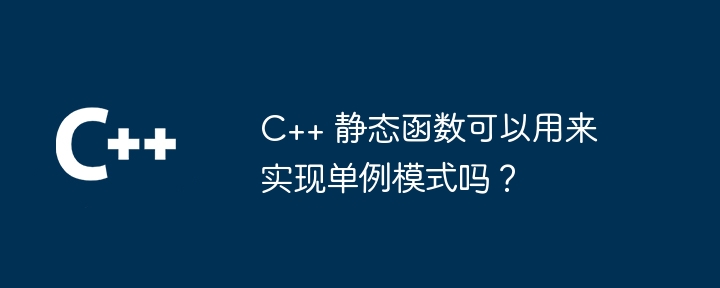Home >Backend Development >C++ >Can C++ static functions be used to implement the singleton pattern?
Can C++ static functions be used to implement the singleton pattern?
- WBOYWBOYWBOYWBOYWBOYWBOYWBOYWBOYWBOYWBOYWBOYWBOYWBOriginal
- 2024-04-16 12:33:01583browse
Using static functions to implement singleton mode in C can take the following steps: declare private static member variables to store unique instances. Initialize static member variables in the constructor. Declare a public static function to get an instance of the class.

Use static functions to implement singleton mode in C
Introduction
Single Instance pattern is a design pattern that ensures that only one instance of a class exists. In C, the singleton pattern can be easily implemented using static functions.
Syntax
Static functions are functions that belong to a class rather than an object. They are declared using the static keyword, and the syntax is as follows:
static return_type function_name(argument_list);
Implementing singleton mode
To use static functions to implement singleton mode, please execute Following steps:
- Declare a private static member variable to store the only instance of the class:
private:
static ClassName* instance;- Initialize the static member variable in the constructor of the class:
ClassName::ClassName() {
if (instance == nullptr) {
instance = this;
}
}- Declare a public static function to get an instance of the class:
public:
static ClassName* getInstance() {
if (instance == nullptr) {
instance = new ClassName();
}
return instance;
}Practical case
Assume we have A Counter class, which is responsible for tracking counter values:
class Counter {
private:
static Counter* instance;
int count;
public:
Counter();
static Counter* getInstance();
void increment();
int getCount();
};The following is the implementation of the Counter class:
// 构造函数
Counter::Counter() : count(0) {}
// 获取类的实例
Counter* Counter::getInstance() {
if (instance == nullptr) {
instance = new Counter();
}
return instance;
}
// 增加计数器
void Counter::increment() {
++count;
}
// 获取计数器值
int Counter::getCount() {
return count;
}Usage example
We can use the getInstance() function to obtain instances of the Counter class multiple times, but only one instance will be created:
Counter* counter1 = Counter::getInstance(); counter1->increment(); Counter* counter2 = Counter::getInstance(); counter2->increment(); std::cout << counter1->getCount() << std::endl; // 输出:2
Conclusion
Using static functions to implement the singleton pattern is a simple and effective technique. It allows you to enforce singleton constraints on a class, ensuring that the same instance is always returned.
The above is the detailed content of Can C++ static functions be used to implement the singleton pattern?. For more information, please follow other related articles on the PHP Chinese website!

